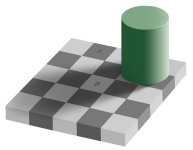Ouch you hit my wheel house with that.
Sensation was my original game. Discovering the one-third octave organization imposed by the organ of corti made sense of human sensing consonance and dissonance for me.
Understanding the relationship of visual motion detection to action in frogs to a person stopped at an intersection stomping on the brakes when a bus pulls up on her right put sense stuff into evolutionary perspective. If you are interested you can read up on the critical band in hearing.
So yes we do you and measure the quality of sensing and of the sensing. In fact possibly our greatest accomplishemts are with making instruments that bring thing down or up to human size as with monstet telescopes and Haldron Colliders. An author and team lead of that project leading to the discovery of Higgs boson particle said it really well. He said something to the effect that humans are the masters of the telescope, masters of of bringing the very distant and very small into our perceptive window.
We do measure sense quality. We relegate sense to the capacity of our receptors to code fundamental material activity in measuring displacement to an angstrom to hear and detection as little as four photons to see and we find this works very well when modelling sensory function which we do when we build operator simulators and simulations. Any book on Human Factors and ergonomics will give you a basis for understanding how we do measure sense by measuring effectiveness of sensors.
You're right, that was poorly phrased on my part. What I'm trying to convey is that the perspective you're describing constitutes the external aspect of sensing, i.e., what sensing looks like from the outside. Sensing looks different from the perspective of the one doing the sensing. That doesn't make it a new thing, with its own thingness (whatever that may mean), just a different angle that isn't captured by the outside view.
The philosophical question, which you may or may not have any interest in, is whether one of these perspectives can be fully described in terms of the other, or whether they are mutually irreducible. For example. There are multiple ways to look at a digital image. One way is to analyze the components and map each pixel. Another way is to view it as a whole, and see it's a picture of a dog. In this case, the second perspective is reducible to the first. If you have all the pixels and know where they go and what color they are, you can reconstruct the dog in the picture.
But is there a way, even in principle, to reconstruct the experience of something visceral and unmistakable--let's say the feeling of nausea--with only an external description of what is happening? Given all the 'pixels' of physiology that satisfy the functional requirements of feeling nauseated, as well as their exact roles and input/output states, the peculiar discomfort of nausea would nonetheless remain absent from this model. That's what I mean when I say the internal aspect isn't explicable by way of the external aspect.
Do you agree, or do you think that a complete explanatory model of nausea would be able to convey how it feels to someone who has never been nauseated?

